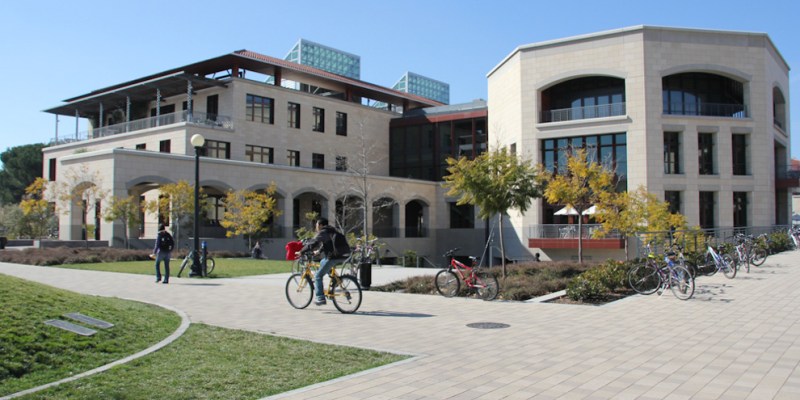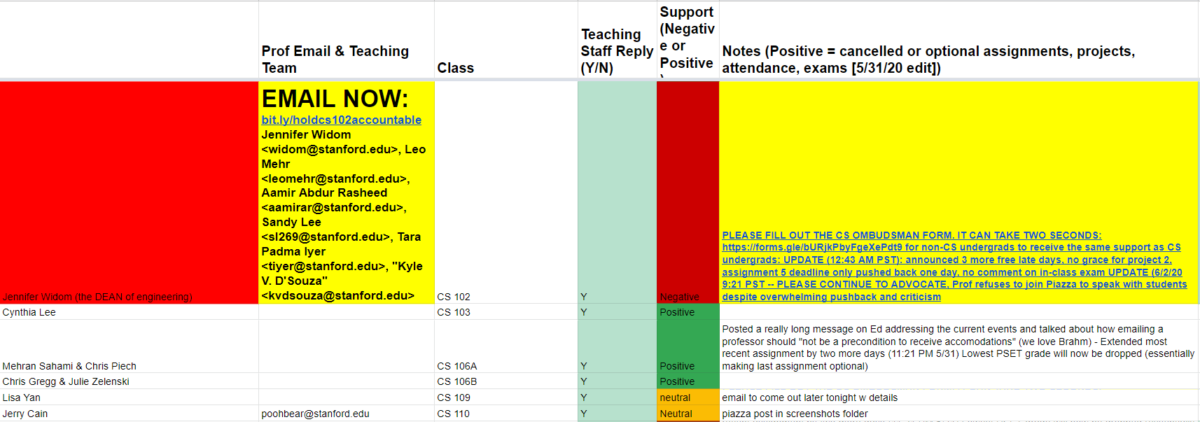Ahmaud Aubery, George Floyd, Tony McDade, Breonna Taylor and many others have been murdered by the police for the color of their skin. The legacy of slavery and segregation continues to hold root in the “Land of the Free,” where innocent people struggle under the hefty chains of systematic discrimination. Racism is a fundamental issue in this country and Black lives matter, full stop.
During this time of turmoil, professors have a duty to show sensitivity and empathy towards students. As an alumna of this University, I commend professors who have proactively adjusted academic requirements by extending deadlines, waiving attendance or even canceling exams. I cannot even pretend to fully understand this trauma as an Asian American woman. What I do know is that the Black community is hurting and needs time to mourn the injustices inflicted on their people.
What is not okay, however, is harassing Stanford professors and their teaching teams because they refuse to capitulate to all academic demands given the recent crises. Furthermore, while some students are asking for accommodations to support affected students, others appear to have been leveraging the recent turmoil for more self-serving reasons.
In the past couple weeks, Stanford students compiled an Excel of professors and their responses to ease academic assignments, grading policies and exams. Professors are rated as “Positive,” “Neutral” or “Negative” depending on students’ assessment of their responses to these requests.
The issue with this spreadsheet is that it equates full concession to students’ demands (i.e., making remaining exams and assignments optional) as “Positive” and anything less (e.g., offering case-by-case accommodations or extending deadlines of psets) as “Neutral” or “Negative.” Rather than allowing professors to decide what changes are best suited for their class, students are pitting professors against each other. Professors with unsatisfactory responses are depicted as unsympathetic to the Black Lives Matter movement, even if they have made individual accommodations and encouraged students to protest recent atrocities.
This methodology amounts to McCarthy-esque scare tactics to pressure professors into evading the most basic of their academic duties: providing and grading assignments to assess students’ mastery of class materials. Students claim to be holding professors accountable, but instead, perpetrate distorted and subjective reports of professors’ responses.
Referring to this controversial document, a group of students published an op-ed in The Stanford Daily entitled, “Why are finals more important than Black lives?” The op-ed singles out Professor Jennifer Widom for her “refusal to accommodate Black students by implementing changes to course requirements in CS102.” The authors claim that she “at best completely misunderstood the point of our asks, and at worst continued to minimize the suffering of Black people.”
This characterization is inaccurate. Prior to the publication of the op-ed, Professor Widom eased a number of course requirements, many of which are comparable to courses labeled as “Positive” in the spreadsheet, including:
- Allowing students to drop assignment #5 and replace it with the average of the previous four assignments, essentially making it optional in a Satisfactory/No Credit system
- Extending project #2’s deadline by a week
- Allowing students who did not wish to take exam #2 to receive an incomplete and clear it via an oral exam over the next year – a similar policy to CS151: Logical Programming which allows incompletes for unfinished exams and was labeled “Positive”
- Setting up a Google Form for those seeking additional accommodations and encouraging students to suggest individuals for the teaching team to prioritize
Many students remained dissatisfied because Professor Widom did not make optional exam #2. Others have argued that dropping the last assignment only benefits students who are currently passing.
Regardless, it is not the demands to make exams optional that are the issue, but how students have advanced these demands. These advocates aim to act as a voice for the oppressed, yet they suppress anyone who disagrees with them. They use claims of moral depravity as a license to force professors to comply with students’ demands, accusing them of complicity with racism if they agree to anything less, even after they have made accommodations.
In response, students have posted inflammatory accusations on the Piazza forum of CS102, equating abuse with the refusal to make exams optional despite amendments to the course. One student writes, “You are the aggressor. You are silencing voices and pitting those you view as subordinates against one another.” Another student describes Professor Widom’s wish to teach in developing countries as “white saviorism.” A student even accused the teaching staff of using “DARVO”: “Deny, Attack, and Reverse Victim and Offender, ” a “gaslighting technique used by abusers” to deny and blame victims for inflicted abuse.
These comments are not forms of advocacy. They are personal attacks that create a toxic learning environment, both for students and professors. There are valid arguments for why remaining exams should be optional, as explained in this op-ed, but students are disseminating sensationalized allegations to guilt Professor Widom into submitting to their demands.
Students have protested against the CS102 staff with many other retaliatory measures. They have flooded the teaching team with emails, accused them of “racism” and “explicitly lying,” repeatedly expressed “disgust” at their decision to hold exams, spread slander on social media to such a point that the ex-CEO of Reddit has called for the involvement of the Stanford ethics board, emailed administrators with screenshots of changes in course policy as evidence of “harassment,” posted on Cardinal Confessions that the instructor “does not care about human lives” and lobbied for the resignation of Professor Widom. In other words, students are demanding that Professor Widom resign for her lack of empathy since she is allowing students to receive an Incomplete if they choose not to take the last exam, which can be made up via an oral exam.
Yet, students continue to accuse the CS102 staff of harassment when they have been relentlessly bullying the staff to enact their demands. Such villainizing tactics only takes away time and energy from teaching teams to dedicate to those who truly need the resources.
The sincerity of some advocates’ motives is also questionable.
In an email template to request academic accommodations for CS102, students make clear their intent: “demand equity for non-CS undergraduates.” The document’s description never mentions Black students who have been traumatically affected by recent events in police brutality. Rather, the templates are motivated by non-CS students struggling to obtain their WAYS credit. The summary declares, “let’s get some credit” and “please help us non-cs undergrads out!!!!”
This is the definition of privilege – taking advantage and repurposing the platform of the vulnerable for your own self-interests. These accusations against the CS102 team are not acts of transparency or bravery. They are attempts to opportunistically promote a false narrative to discredit and punish those who will not readily acquiesce to their demands.
You may disagree with the final decisions of Professor Widom and her teaching staff. You may even find their decisions unsympathetic or privileged. However, they have undoubtedly tried to show empathy and support for those affected and do not deserve such spiteful treatment. The one-sided public discourse has failed to show the true manner in which the CS102 staff has accommodated students’ needs.
Stanford students are trying to take the moral high ground, yet their tactics and motives border on harassment. It is disappointing to see students stoop to such measures in a world already filled with so much hate and divisiveness. If students cannot manage to advocate for themselves respectfully in a university setting, I am skeptical as an alumna of their abilities to enact change outside of the Stanford bubble. Those hoping to strong-arm individuals into compliance in the real world will instead find themselves stifled, bitter and disillusioned.
*For full transparency, I do not personally know anybody on the CS102 teaching team nor Professor Widom.
Contact Minjia Zhong at mzhong2 ‘at’ alumni.stanford.edu
The Daily is committed to publishing a diversity of op-eds and letters to the editor. We’d love to hear your thoughts. Email letters to the editor to eic ‘at’ stanforddaily.com and op-ed submissions to opinions ‘at’ stanforddaily.com.


